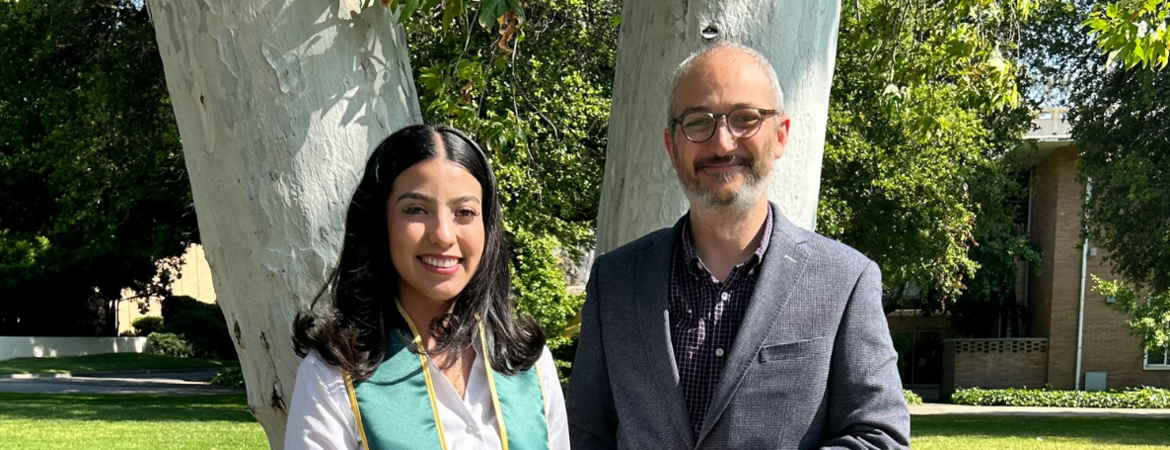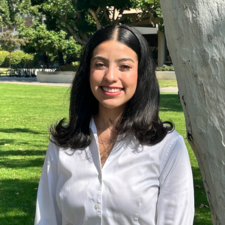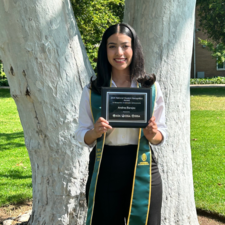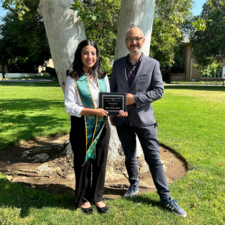
Andrea Barajas, a fourth-year Environmental Sciences student at the UC Riverside College of Natural & Agricultural Sciences (CNAS), has been awarded the National Student Recognition award in recognition of her work with the Digital Agriculture Fellowship (DAF) by the American Society of Agronomy (ASA), the Crop Science Society of America (CSSA), and the Soil Science Society of America (SSSA).
Every year, top-notch undergraduate seniors are selected for the award based on their scholarship, leadership, and involvement. Winning students must be enrolled in agronomic, crop, soil, or environmental science departments affiliated with the Students of Agronomy, Soils, and Environmental Sciences (SASES), the undergraduate program of the ASA, CSSA and SSSA.
"Andrea has been a great addition to the DAF community," said Noel Salunga, CNAS Assistant Director for Student Success and program manager for the Research in Science & Engineering (RISE) program. "She is always willing to be part of DAF events and activities [and] is always the first to volunteer for what we are doing."
"She's always willing to engage with her peers about her research experience and help them as well," added Salunga. "She has a great personality and humble attitude, which makes her a great representative of DAF and CNAS."
Barajas grew up in Perris, CA and attended Orange Vista High School, where the STEM curriculum opened her eyes to the interdisciplinary nature of science. "I've always been interested in science and the natural world," she said. "I took AP Human Geography and AP Environmental Science, and I got to see how much of a difference it makes for communities to have good environmental quality. We also studied how education makes a different in quality of life...it all just went hand-in-hand."
Barajas' senior year of high school ended with her taking courses online due to the COVID pandemic. She describes her first year at UC Riverside as a challenging experience. "I felt very intimidated by my classes, and it seemed like some of my peers had more background experience on the topics," she remembered. "But I learned a lot as well, and offered myself some grace to catch up."
After completing her first year at UC Riverside, Barajas attended the National Hispanic Environmental Council meeting to learn more about becoming an environmental scientist. She credits the experience with giving her access to likeminded peers, plus opportunities for fieldwork and mentorship from Environmental Protection Agency (EPA) workers. "I got to see what you can do with a career in environmental science," she says, "and when I got back from the that trip, I told myself that I wanted to try research."
Her desire to take part in research led her to Dr. Jay Gan, Professor of Environmental Chemistry in the UC Riverside Department of Environmental Sciences. The Gan Lab has long been investigating environmental chemistry, toxicology, and risk mitigation of organic chemicals in the environment.
"I was really intimidated when I started!" remembers Barajas. "I hadn't had any lab experience since all of my previous labs had been online...I'd just watched people conduct experiments, but I hadn't conducted any myself."
Barajas worked alongside postdoctoral scholars conducting experiments on fungicides and soils, performing extractions for the new synthetic fungicides being tested. She credits the lab with providing her with her first research experience in a warm, welcoming environment.
"They were very gracious and taught me how to do everything, so that's how I ended up getting my first lab experience," she said. "It was awesome!"
"Andrea has a genuine passion and broad interest for environmental science, and has made invaluable contributions to several projects working alongside postdoctoral researchers and Ph.D. students at UCR," said Dr. Gan. "Andrea is poised to become a young scientist who will make a difference in the world."
Her experience in Dr. Gan's lab inspired Barajas to seek out additional research opportunities at UC Riverside, a search would led her to the Digital Agriculture Fellowship (DAF), a program funded by the U.S. Department of Agriculture's National Institute for Food and Agriculture. The fellowship's goals are to ignite interest in agricultural careers by equipping students with essential skills and experiences in the areas of digital agriculture and environmental data science.
At UC Riverside, DAF participants participate in a 15-month paid fellowship that includes hands-on research experience, mentorship, networking opportunities, skill development, career preparation, opportunities to work with local agricultural technology companies, and academic advancement in agricultural sciences.
DAF students also develop leadership skills through the affiliated Digital Agriculture and Agronomy Student Club, which helps organize events such as Find Your Research Match for the greater UC Riverside community.
"DAF students work on a broad range of agricultural science projects at CNAS," explained Elia Scudiero, Research Agronomist at UC Riverside. "Recent student projects include soil mapping, agricultural hydrology, machine learning, and big data management."
"I knew that I wanted an immersive research experience where I also had more mentorship and the ability to take on multiple projects," Barajas explains. "When I saw the Digital Agriculture Fellowship, it aligned with all of my interests because I care about agricultural sustainability. I also put myself through school, so having a funded research position allowed me to continue paying my way through school."
Barajas adds, "Working part-time during the school year was great, because I was able to take my work home with me. During the summer, [DAF] gave me a better opportunity to focus on the work because I wasn't taking any other classes."
Another driving factor in her DAF interest was the opportunity to work with Geographic Information Systems (GIS), computer systems that analyze and display geographically referenced information, a vital tool for a budding environmental scientist.
"GIS allows you to combine many different things," explains Barajas. "The data points make everything more attainable. It allows you to better comprehend all of the information you have about your study areas."
For her DAF project, Andrea worked with Dr. Alex Putman, Associate Professor of Cooperative Extension in Plant Pathology, on weed detection through drone imaging. She would go out into a research field with postdoctoral scholars and use a drone outfitted with a mounted sensor to capture bands of light when flown over a crop of pepper plants. The bands were then used to create multi-spatial analysis maps identifying both pepper plants and weeds. She also performed similar research detecting weeds in onion fields in Tulelake, CA.
"I used ArcGIS to go through and validate the two-step identification process we used to identify weeds in the field," explains Barajas. "It's a form of digital agriculture that farmers can use to remove weeds more efficiently...they would know where the weed density is."
"Andrea is awesome, and we loved having her to work on this project," said Dr. Putman. "Andrea is highly self-motivated, eager to learn new skills, and comfortable doing things outside of her experience. She is very organized, manages her time well, and has good communication skills."
Barajas' DAF experience culminated in attending a national conference in St. Louis, MO, where she presented her research poster and interacted with other scientists.
"Being able to present was an incredible experience because I hadn't presented my research before," says Barajas. "It was a great networking opportunity and bonding experience for the DAF fellows!"
According to Barajas, the DAF experience with not only bolstered her research skills, but taught her to move through limitations and persevere through mistakes.
"I've come to realize and accept that sometimes you make mistakes," she says. "Sometimes you can do everything right on your end, and for whatever reason it doesn't work out. That's okay! Thankfully, when those kinds of things happened, all of my mentors were very kind and understanding, and they showed me how to move forward."
"Andrea was a responsible student and eager to learn," said Ahmed Kayad, the Agricultural Engineer Advisor with whom Andrea worked. "She gave good comments on her work results, reasons for errors and communicated her work in a clear manner."
Barajas' research experiences also taught her to focus on the overall goals of her work. "What has stuck with me is remembering the bigger picture," she says. "Even though my research projects were all different, they're all part of agricultural sustainability, from soil sampling and taking drone images to testing the water that's being fed to crops. I've developed an interest in plant pathology, and understanding how environmental conditions affect the health of the plant and the crops. That's vital for a healthy environment and being able to feed the world.
When asked what she enjoyed most about her UC Riverside research experiences, Barajas pointed to the mentorship she'd received from faculty and staff.
"Noel and Elia are very kind and motivating, as is Dr. Gan...he always tells me to aim high!" she says. "I'm a first-generation student, so this has been something I've had to figure out on my own. Having mentors who really see and value my potential and guide me into becoming a better researcher...I'm very grateful for that. They make me feel very empowered, and they open the door for opportunities for me all the time."
Barajas has important advice for future generations of Highlanders interested in tapping into UC Riverside's vast undergraduate research opportunities.
"If you see an opportunity that sparks your interest, you should go for it," she says. "Just putting yourself out there...I know it can be scary sometimes, but the rewards can be greater than you ever imagined. There are so many ways to get involved, and so many ways to get guidance in research. Don't be afraid to ask around...most students are more than happy to share their experiences and offer guidance as well."
Barajas plans on continuing her scientific journey after earning her B.S. in Environmental Sciences from UC Riverside in June. "I'm doing to the Latinx and the Environment full-time fellowship program this summer with Dr. Gan. After that, I'll be applying for Ph.D. programs in environmental science.
Barajas is poised to continue making an impact in the scientific community for years to come. "I feel like there's nothing I can't do if I set my mind to it."
Learn more about the Digital Agriculture Fellowship
Learn more about the Research in Science & Engineering (RISE) program


